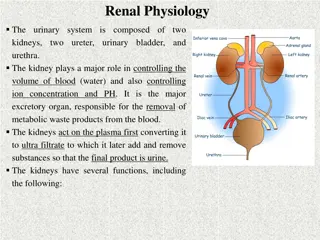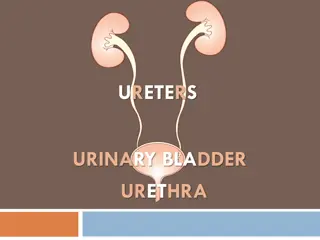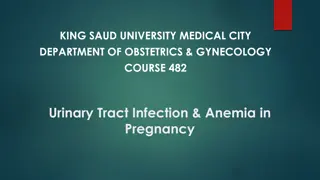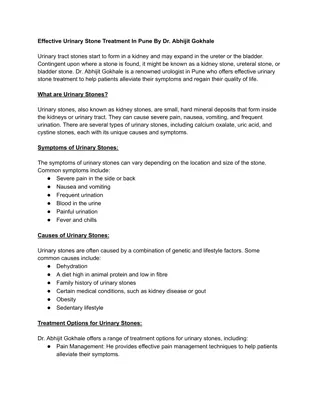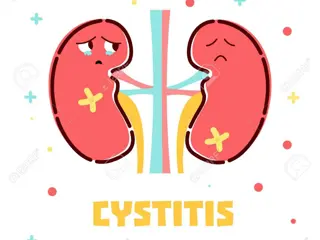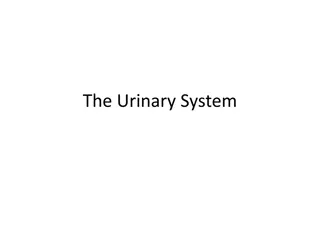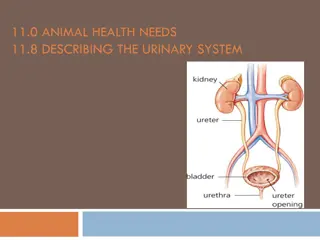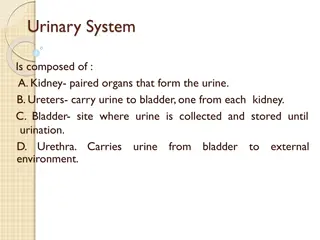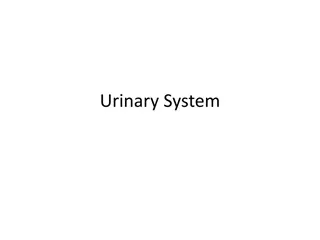Understanding Urinary Elimination: Anatomy, Physiology, and Function of the Kidneys
The lecture covers the fundamentals of urinary elimination focusing on the kidneys' location, structure, function, and the role of nephrons. It discusses the transport of urine through the ureters to the bladder, highlighting the bladder's muscle layers and the urethra's role in expelling urine. Stu
3 views • 37 slides
Understanding Urinary Tract Infections (UTIs) and Antibiotics: A Comprehensive Overview
Urinary Tract Infections (UTIs) are a common issue, more prevalent in women, with causes ranging from poor hygiene to underlying health conditions. The content delves into the classification of UTIs, their main causes, and bacteria responsible for infections. It also covers the complications of UTIs
0 views • 12 slides
The Best Urinary Incontinence– Healthy Lifestyle Bariatrics
You're looking for one of the best urinary incontinence services in the United States offered by Healthy Lifestyle Bariatrics. Gynecomastia surgery, excessive cholesterol, and other therapies involving many body modification procedures are offered. If you need more information, please visit our webs
0 views • 9 slides
Understanding the Urinary System: Anatomical Structures and Terms
This informative content delves into the anatomical structures and terms related to the urinary system, covering key components such as the kidneys, ureters, bladder, and urethra. It explains important terms like renal pyramids, calices, and ureter dexter/sinister, providing a comprehensive overview
1 views • 8 slides
Understanding Urinary Incontinence in the Elderly
The urinary system plays a vital role in regulating blood volume, pressure, and waste excretion. Urinary incontinence in the elderly can be caused by weak bladder muscles or neurological issues. The bladder consists of 4 layers, each serving a specific function. Normal voiding frequency and bladder
0 views • 50 slides
Understanding Urinary System Function in Veterinary Medicine
The urinary system in veterinary medicine involves the anatomy and physiological functions of maintaining body fluid composition and volume. Key processes like urine production, filtration, reabsorption, and regulation through nephrons play vital roles in maintaining overall health. This article cov
1 views • 14 slides
Understanding Medications and Pharmacological Therapy for Urinary Incontinence
This learning module for clinicians discusses the physiology of bladder control, age-related changes in the genitourinary system, medications that contribute to urinary incontinence, pharmacological treatments for UI, side effects of medications used for UI, and a senior-friendly approach to optimiz
0 views • 30 slides
Overview of Urinary System Anatomy and General Terminology
This content provides detailed information on the anatomy of the urinary system, including the kidneys, ureters, bladder, and urethra. It explains anatomical terms, Greek term elements related to the system, and general terms for urine and urination. Additionally, it covers urinary dysfunctions such
2 views • 8 slides
Veterinary Anatomy of Urinary System in Different Animals
The urinary system in animals includes kidneys, ureters, and the bladder, all crucial for filtration and urine excretion. The ureters are excretory ducts from the kidneys, while the bladder stores urine before expulsion. Various diagrammatic structures illustrate the urogenital system of animals, pa
0 views • 20 slides
Veterinary Guide to Urinary System Examination
This guide covers the examination of the urinary system in veterinary medicine, including collection and analysis of urine samples. It discusses different aspects such as color, volume, transparency, specific gravity, and common interpretations based on findings. Through clear illustrations and deta
0 views • 19 slides
Understanding Renal Physiology: The Role of the Kidneys in Maintaining Homeostasis
The urinary system consists of the kidneys, ureters, urinary bladder, and urethra, playing a crucial role in regulating blood volume, ion concentration, and pH. The kidneys, as the major excretory organ, remove metabolic waste products and help maintain water-electrolyte balance, regulate arterial p
0 views • 27 slides
Overview of Urinary Tract Infections in Adults: Symptoms, Diagnosis, and Treatment Guidelines
This information discusses the symptoms and diagnostic approach for urinary tract infections in adults, along with the current management guidelines. It covers the prevalence of UTIs as a common healthcare concern, focusing on uncomplicated UTIs, acute uncomplicated cystitis, and pyelonephritis. The
1 views • 35 slides
Understanding the Anatomy of Ureters, Urinary Bladder, and Urethra
Explore the detailed anatomy of ureters, urinary bladder, and urethra in this comprehensive guide. Learn about the course of ureters, important relations of the urinary bladder, and differences in male and female urethra. Discover the sites of ureteric constrictions, arterial blood supply, and more.
0 views • 22 slides
Understanding Urinary Retention: Causes, Symptoms, and Management
Urinary retention can be acute or chronic, resulting in the painful inability to void or fully empty the bladder. In men, common causes include benign prostatic enlargement and post-surgery complications, while women may experience it due to pelvic prolapse or neurological issues. Initial management
3 views • 13 slides
Urinary Tract Infections and Anemia in Pregnancy: Overview and Management
This course discusses the common medical complications of urinary tract infections and anemia in pregnancy, including types of UTI recurrences, pathophysiology, common causative organisms, anatomical changes in pregnancy leading to increased risk, risk factors for UTIs in pregnancy, and more.
0 views • 26 slides
Management of Urinary Tract Infection: Important Notes and Guidelines
Understanding the management of urinary tract infections (UTI) is crucial for healthcare professionals. The main goal is to eradicate offending organisms using antibiotics, which vary based on factors like infection type and patient profile. Treatment duration and antibiotic choices differ for relap
0 views • 16 slides
Understanding Urinary Tract Infections During Pregnancy
Urinary tract infections are common bacterial infections during pregnancy, with asymptomatic bacteriuria being prevalent. If left untreated, asymptomatic bacteriuria can lead to symptomatic infection, but proper treatment with antimicrobial agents can prevent complications. Treatment options include
3 views • 26 slides
Urinary Stone Treatment In Pune
Urinary stones, including kidney stones and bladder stones, can be a painful and disruptive condition that affects many individuals. If you are seeking expert treatment for urinary stones in Pune, look no further than Dr Abhijit Gokhale, a highly ski
1 views • 3 slides
Overview of Urinary Symptoms and Associated Infections
Collection of urinary symptoms like dysuria, frequency, and urgency caused by bladder inflammation, commonly due to E. coli infection from the GI tract. Cystitis, prevalent in women, rare in men, can resolve within 3 days without treatment. Additional symptoms, causes, and treatment options for cyst
1 views • 19 slides
Development of the Urinary Bladder and Urethra in Embryology
Understanding the embryonic development of the urinary bladder and urethra involves studying the formation of the cloaca, division of the urogenital sinus, absorption of mesonephric ducts, position and fate of the urachus, and anomalies related to these structures. The cloaca, primitive urogenital s
0 views • 14 slides
Understanding the Urinary System: Function and Structure
The urinary system, also known as the excretory system, plays a crucial role in regulating water and salt levels in the body, as well as excreting wastes through urine. It consists of organs like the kidneys, ureters, bladder, and urethra, each with specific functions in the filtration and eliminati
0 views • 18 slides
Understanding Urinary Tract Wellness and Illness with Prof. Dr. Rabea M. Ali
The urinary system plays a vital role in our overall health by regulating blood volume, composition, pressure, pH balance, and more. Keeping the urinary tract healthy involves proper hydration, diet choices, and lifestyle habits. Foods like berries, yogurt, garlic, and antioxidants can promote urina
0 views • 41 slides
Understanding Urinary Retention: Definition, Causes, and Management
Urinary retention is the inability to completely empty the bladder, often leading to overflow incontinence. It can result from various factors such as diabetes, prostate enlargement, neurological disorders, and certain medications. This condition can pose complications and requires proper diagnostic
0 views • 24 slides
Strategies for Preventing Catheter-Associated Urinary Tract Infections
Catheter-associated urinary tract infections are a common healthcare-associated infection, with 80% of hospitalized patients experiencing a urinary tract infection. This article provides guidelines for preventing CAUTIs, such as only catheterizing patients when necessary, maintaining asepsis, practi
0 views • 20 slides
Comprehensive Guide to Urinary Tract Infections: Symptoms, Treatment, and Prevention
This detailed guide covers urinary tract infections (UTIs) including symptoms in women, pregnant women, and men, risk factors like bacteriuria, management of recurrent UTIs, and treatment options. It emphasizes the importance of proper diagnosis, antibiotic therapy, and self-care practices for effec
0 views • 18 slides
Understanding Urinary Tract Infections (UTIs) in Long-Term Care Settings
Urinary tract infections (UTIs) in long-term care facilities present challenges due to non-specific symptoms in residents. This module explores the signs, symptoms, and testing guidelines for UTIs, emphasizing the importance of recognizing and addressing UTIs in non-communicative residents. Learn ab
0 views • 13 slides
Understanding Vaginal Symptoms in Menopause and Barriers to Treatment
The article discusses the various symptoms associated with the Genitourinary Syndrome of Menopause (GSM) such as decreased vaginal moisture, urinary frequency, and sexual difficulties. It highlights the prevalence of these symptoms in women and the barriers to seeking treatment, including discomfort
1 views • 7 slides
Urinary Tract Infection Treatment and Prevention During Pregnancy
Effective management of urinary tract infections (UTIs) during pregnancy involves promoting urinary health, emphasizing safety of antimicrobial treatment, and understanding FDA categories for medication use. Recommendations include fluid intake, perineal hygiene, and maintaining bladder health. Safe
0 views • 13 slides
Preventing Catheter-Associated Urinary Tract Infections
This presentation covers the prevention of catheter-associated urinary tract infections (CAUTIs) in healthcare settings. It highlights the significance of urinary tract infections, risk factors, preventive measures, and common microbiology involved. Key topics include the importance of urine collect
0 views • 34 slides
Understanding Irritable Bowel Syndrome: Symptoms, Diagnosis, and Management
Define constipation and diarrhea, discuss the definition, etiology, and classification of IBS, explain how to diagnose IBS, list alarm symptoms and differential diagnosis, provide a management plan and follow-up, and recognize when to refer to a specialist. People with irritable bowel syndrome may s
0 views • 35 slides
Genitourinary Syndrome of Menopause (GSM) - Symptoms and Management Overview
Genitourinary syndrome of menopause (GSM) encompasses urovaginal symptoms associated with hormonal changes during menopause. Symptoms include vaginal dryness, burning, itching, dyspareunia, urinary urgency, and more. Thin, pale epithelium and tissue changes are common. Management involves various tr
0 views • 14 slides
Understanding Urinary Elimination and Related Health Conditions
The urinary system plays a vital role in removing waste from the body through organs like the kidneys, ureters, bladder, and urethra. Various factors influence urination, including brain structure and disease processes such as diabetes, multiple sclerosis, and ESRD. Dialysis is an important treatmen
0 views • 28 slides
Stroke Continence Protocols for Managing Bladder and Bowel Function After Stroke
This protocol outlines the management of urinary and bowel incontinence in stroke patients, emphasizing high nursing care levels and avoiding unnecessary catheterization. It discusses normal bladder functions, urinary dysfunction prevalence post-stroke, and interventions for promoting continence. Ur
0 views • 30 slides
The Essentials of the Urinary System
The urinary system plays vital roles in maintaining internal balance, filtering fluids, regulating blood volume and pressure, and producing essential hormones. Consisting of organs like the kidneys, ureters, bladder, and urethra, the system functions through processes like urine formation, tubular r
0 views • 13 slides
Understanding the Urinary System: Functions and Disorders
The urinary system, also known as the renal system, is responsible for producing, storing, and eliminating urine. It includes the kidneys, ureters, bladder, and urethra. This system works with other organs to maintain the balance of chemicals and water in the body. Renal and urinary disorders such a
0 views • 6 slides
Understanding the Canine Urinary System: Functions and Parts Explained
Explore the intricate details of the dog's urinary system, including the kidneys, nephrons, ureters, urinary bladder, and urethra. Learn how these components work together to maintain proper waste filtration and blood circulation. The images provided offer a visual guide to aid in understanding the
0 views • 6 slides
Understanding the Human Urinary System
The human urinary system consists of the kidneys, ureters, bladder, and urethra. The kidneys filter blood to produce urine, which is carried to the bladder through the ureters for storage until excretion. Each kidney is structured with renal pyramids and nephrons for blood filtration and waste remov
0 views • 16 slides
Overview of the Urinary System: Functions, Structure, and Importance
The urinary system plays a crucial role in maintaining water and salt balance, regulating pH levels, and excreting waste products like urea and uric acid. Comprising of organs such as the kidneys, ureters, urinary bladder, and urethra, this system ensures the removal of metabolic waste from the body
0 views • 34 slides
Comprehensive Overview of Urinary Incontinence in Women According to NICE Guidance
This December 2017 presentation focuses on urinary incontinence in women, outlining approaches for patients with urge, stress, and mixed incontinence in line with NICE guidance. It covers referral criteria, management strategies, and specialist referral recommendations including the 2-week rule for
0 views • 29 slides
Understanding Urogynaecology: A Comprehensive Overview
Urogynaecology is a subspecialty of Gynaecology that focuses on female lower urinary tract and genital tract issues. This field has evolved significantly with the introduction of Urodynamics in 1970, leading to better diagnoses and management of conditions like urinary incontinence and pelvic organ
0 views • 31 slides










